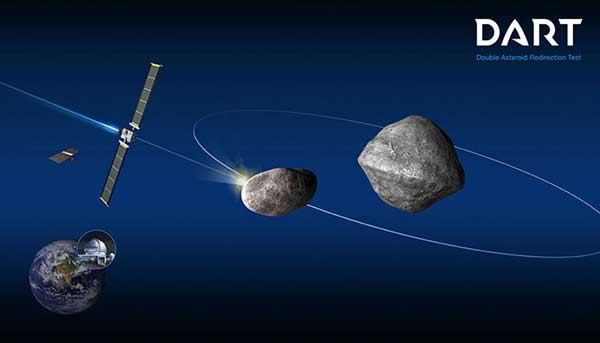VANDENBERG SPACE FORCE BASE, Calif. (NASA PR) — Social media users are invited to register to take part in our global virtual NASA Social for the Double Asteroid Redirection Test (DART) mission, directed by NASA and the Johns Hopkins Applied Physics Laboratory (APL). This mission is targeted to launch at 10:20 p.m. PST, Nov. 23, 2021, (1:20 a.m. EST, Nov. 24), aboard a SpaceX Falcon 9 rocket from Vandenberg Space Force Base in California.
DART is a spacecraft designed to impact an asteroid as a test of technology to see if it can change the motion of an asteroid in space. The goal of the mission is to see if intentionally crashing a spacecraft into an asteroid is an effective way to change its course, should an Earth-threatening asteroid be discovered in the future. Its target is the binary near-Earth asteroid Didymos and its moonlet, which pose no threat to Earth.
If your passion is to communicate and engage the world via social media, then this is the event for you! Seize the opportunity to blog, tweet, post or simply share everything about the DART mission.
While we cannot invite the public onsite for one of our usual NASA Social events, we are excited to present an opportunity for people of all ages from all around the world to participate in.
NASA Social participants will have the opportunity to:
Connect virtually with a community of people excited about the #DARTMissionAnswer a short series of questions to earn their very own #PlanetaryDefender badge and certificateWatch exclusive behind-the-scenes videos about the missionObtain your own NASA Social badge to shareLearn more about the spacecraft, the rocket launching DART and the mission objectives
The NASA Social event page will open on Wednesday, Nov. 10 and everyone is invited to join by selecting the “Going” button. Please note by attending the virtual event, you are explicitly agreeing to a set of rules/guidelines and anyone who breaks these rules may be banned from the event page.
All resources, participation, and registration are FREE. Register below to let NASA know that you’re virtually participating!
Do I need to have a Facebook account to register?
Yes. This event is designed for people who:
Actively use multiple social networking platforms and tools to disseminate information to a unique audience.Have previous postings that are highly visible, respected and widely recognized.
Users on all social networks are encouraged to use the hashtag #DARTMission, #PlanetaryDefense and #NASASocial. You can also track DART’s journey on social media. Follow these accounts for the latest:
Twitter: @NASA, @NASASolarSystem, @AsteroidWatch, @JHUAPL, @NASAKennedy, @NASA_LSPFacebook: /NASA, /NASASolarSystem, /JHUAPL, /NASAKennedy, /NASALSPInstagram: @nasa, @nasasolarsystem, @johnshopkinsapl, @nasakennedy
How do I join?
Select “Going” for this event on the designated Facebook event page. Please note: By “attending” the Facebook event, you are explicitly agreeing to the group’s rules as set forth by NASA.
Can I register if I am not a U.S. citizen?
Yes! This is a global NASA Social, and we would love for you to be a part of it.
What if I don’t have a Facebook account?
If you don’t have a Facebook account, you can still join us virtually with Eventbrite to experience the launch of the DART mission! Register here. You’re also welcome to watch and participate in the launch by tuning in on Nov. 23 (PST)/Nov. 24 (EST) for the launch broadcast. You can watch live on Facebook, Twitter, YouTube, Twitch or NASA TV.
What if the launch date changes?
Hundreds of different factors can cause a scheduled launch date to change multiple times. If the launch date changes prior, NASA may adjust the date of the NASA Social accordingly to coincide with the new target launch date. NASA will notify registrants of any changes on the Facebook event page.
If the launch is postponed, attendees will be able to watch the launch at a later date on the Facebook event page.
Check http://www.nasa.gov/social for updates.
The use of the NASA logo or identifiers without permission of the Office of Communications is prohibited by federal statute and regulations, the violation of which may include fines, imprisonment, or both.
– Advertisement –
